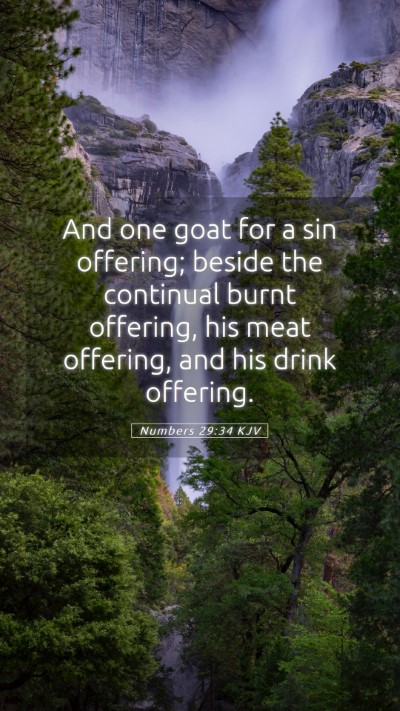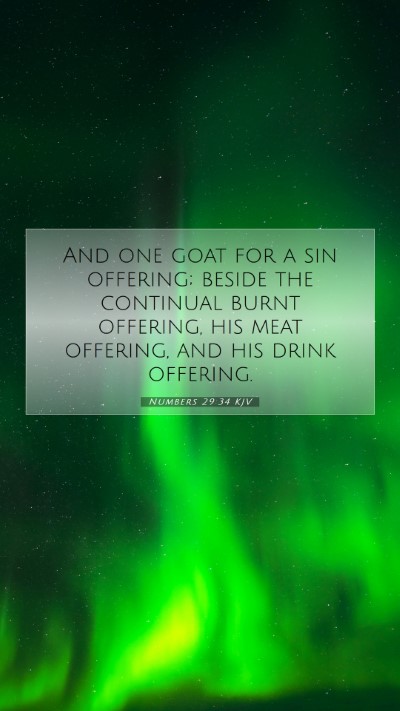Understanding Numbers 29:34 - Bible Verse Meaning and Commentary
Numbers 29:34 states: "And one kid of the goats for a sin offering, to make an atonement for you:" This verse is part of the instructions given to the Israelites concerning their observance of the Feast of Tabernacles. In this passage, the focus is on the sin offering that is required, highlighting the necessity of atonement for the people.
General Insights
The concept of atonement through sacrifices is a critical theme throughout the Old Testament. In this context, the sacrifice of the kid of goats symbolizes purification and the restoration of the relationship between God and His people. The detailed requirements of the offerings reflect God's holiness and the seriousness of sin.
Bible Verse Commentary
Different biblical scholars provide valuable insights into the meaning of this verse. Below is a summary of their interpretations:
-
Matthew Henry notes that this sacrifice serves as a reminder of the continual need for atonement in the life of the Israelites. The sin offering illustrates that all people sin and need grace. This offering sets a tone of humility and dependence upon God's mercy.
-
Albert Barnes emphasizes that the specific mention of a kid of goats highlights the accessibility of the sacrifice for the people during the Feast. It teaches that God provides a means for maintaining holiness and being reconciled to Him, therefore underscoring God's caring nature.
-
Adam Clarke comments on the significance of the specific type of sacrifice. He points out that this particular offering symbolizes the sinless nature of Christ, who is the ultimate sin offering. His commentary locates the practice within the broader narrative of redemption and foreshadowing of the New Testament.
Deepening Understanding of Scripture
To gain a deeper understanding of Numbers 29:34, it’s helpful to consider the historical context, the significance of sacrificial laws, and their implications for New Testament theology. The requirement of an atonement reflects the seriousness of sin and the desired restoration of God's relationship with His people.
Historical Context
In ancient Israel, sacrifices were an integral part of worship and daily life. The sacrificial system provided a means through which individuals could express repentance and seek reconciliation with God. Each type of offering had distinct purposes, and understanding these can offer clarity on the role of sacrifices within the covenant community.
Application to Daily Life
The essence of atonement and sacrifice found in Numbers 29:34 teaches modern believers about the importance of acknowledging sin and seeking restoration in their relationship with God. It encourages reflection on the workings of grace and the ongoing need for repentance in a believer’s life.
Key Themes and Reflections
- Sin and Atonement: The need for sacrifices emphasizes the reality of sin and the necessity of atonement for believers.
- God’s Holiness: The instructions regarding sacrifices reflect the holiness of God and the seriousness with which He regards sin.
- Restoration: The act of making an offering symbolizes God's desire for restoration and relationship with His people.
Cross References
To further enhance your understanding of the themes in Numbers 29:34, consider the following related scripture passages:
- Leviticus 4:32-35 - Discusses the procedure for sin offerings.
- Hebrews 9:22 - Highlights the necessity of blood for the forgiveness of sins.
- Romans 3:25 - Speaks of redemption through Christ as a sacrifice for sin.
Conclusion
Numbers 29:34 invites deep reflection on the significance of atonement, God’s provision for reconciliation, and the resulting worshipful living that honors His holiness. For those engaging in Bible study, this verse serves as a profound reminder of the cost of grace and the importance of sacrificial love encapsulated in the teachings of the New Testament.


